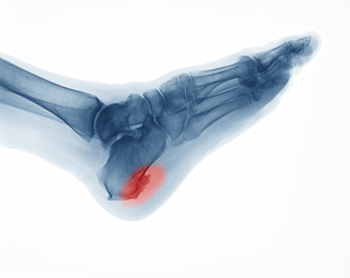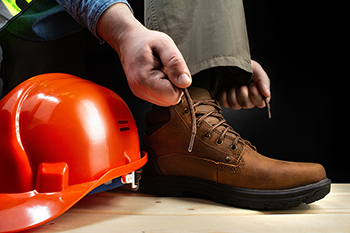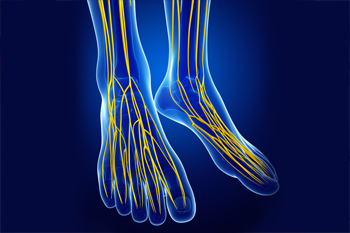Connect With Us
Blog
Items filtered by date: February 2022
Heel Spurs: The Body’s Response to Stress on Ligaments and Tendons
A heel spur is a pointy accumulation of calcium deposits that build up over time on the heel bone. They are the body’s response to repetitive strain or localized inflammation where soft tissues meet the bone. Heel spurs can develop at various locations on the heel bone. When the Achilles tendon becomes inflamed, a heel spur can sometimes develop at the back of the heel (where the tendon attaches to the bone). When the long tissue that connects the toes with the heel (plantar fascia) becomes damaged and inflamed, heel spurs can sometimes form on the heel under the arch. Obesity, gait abnormalities, flat feet or high arches, age, improperly fitted shoes, and other factors that stress the feet can also contribute to the formation of a heel spur. Some heel spurs can cause pain and tenderness, while others are asymptomatic, and only become discovered on an X-ray taken to diagnose another condition. A podiatrist can treat a heel spur through a variety of conservative treatments including icing and resting, physical therapy, stretching, oral or injectable anti-inflammatory medications, and custom orthotic devices.
Heel spurs can be incredibly painful and sometimes may make you unable to participate in physical activities. To get medical care for your heel spurs, contact one of our podiatrists from Podiatry Care Specialists. Our doctors will do everything possible to treat your condition.
Heels Spurs
Heel spurs are formed by calcium deposits on the back of the foot where the heel is. This can also be caused by small fragments of bone breaking off one section of the foot, attaching onto the back of the foot. Heel spurs can also be bone growth on the back of the foot and may grow in the direction of the arch of the foot.
Older individuals usually suffer from heel spurs and pain sometimes intensifies with age. One of the main condition's spurs are related to is plantar fasciitis.
Pain
The pain associated with spurs is often because of weight placed on the feet. When someone is walking, their entire weight is concentrated on the feet. Bone spurs then have the tendency to affect other bones and tissues around the foot. As the pain continues, the feet will become tender and sensitive over time.
Treatments
There are many ways to treat heel spurs. If one is suffering from heel spurs in conjunction with pain, there are several methods for healing. Medication, surgery, and herbal care are some options.
If you have any questions feel free to contact our offices located in West Chester, and Broomall, PA . We offer the latest in diagnostic and treatment technology to meet your needs.
Heel Pain Caused by Plantar Fasciitis
Plantar fasciitis, the most common type of heel pain, is typically caused by overuse of the plantar fascia—the fibrous tissue on the sole of the foot that connects the heel bone with the toes. This condition occurs when the plantar fascia gets overly stretched or damaged, including small tears where this connective tissue joins with the heel bone. Plantar fasciitis causes stabbing pain on the bottom of the heel. It is often worse in the morning when you first wake up, since the plantar fascia has tightened overnight. As you begin stretching the plantar fascia with regular movement, the pain usually lessens, only to increase again as the day progresses. Plantar fasciitis can happen to anyone who overloads the plantar fascia through excessive exercise, obesity or pregnancy and wearing improper footwear, as well as those with diabetes or structural abnormalities in the feet. Podiatrists have many effective treatments for plantar fasciitis. If you are experiencing heel pain, it's a good idea to make an appointment with a podiatrist near you.
Plantar fasciitis is a common foot condition that is often caused by a strain injury. If you are experiencing heel pain or symptoms of plantar fasciitis, contact one of our podiatrists from Podiatry Care Specialists. Our doctors can provide the care you need to keep you pain-free and on your feet.
What Is Plantar Fasciitis?
Plantar fasciitis is one of the most common causes of heel pain. The plantar fascia is a ligament that connects your heel to the front of your foot. When this ligament becomes inflamed, plantar fasciitis is the result. If you have plantar fasciitis you will have a stabbing pain that usually occurs with your first steps in the morning. As the day progresses and you walk around more, this pain will start to disappear, but it will return after long periods of standing or sitting.
What Causes Plantar Fasciitis?
- Excessive running
- Having high arches in your feet
- Other foot issues such as flat feet
- Pregnancy (due to the sudden weight gain)
- Being on your feet very often
There are some risk factors that may make you more likely to develop plantar fasciitis compared to others. The condition most commonly affects adults between the ages of 40 and 60. It also tends to affect people who are obese because the extra pounds result in extra stress being placed on the plantar fascia.
Prevention
- Take good care of your feet – Wear shoes that have good arch support and heel cushioning.
- Maintain a healthy weight
- If you are a runner, alternate running with other sports that won’t cause heel pain
There are a variety of treatment options available for plantar fasciitis along with the pain that accompanies it. Additionally, physical therapy is a very important component in the treatment process. It is important that you meet with your podiatrist to determine which treatment option is best for you.
If you have any questions, please feel free to contact our offices located in West Chester, and Broomall, PA . We offer the newest diagnostic and treatment technologies for all your foot care needs.
We Can Treat Your Foot or Ankle Pain
Choosing Work Footwear That Works
Here are a few tips on finding the perfect fit in your work boots or work shoes. First, the shoe/boot should be snug, but not tight. The back of the shoe or boot should hug (but not cut into) the heel, and the ball of your foot should lay comfortably in the ball of the shoe. There should be space between the tips of the toes and the toe box. Your toes should have enough room to move a bit and they should never be squeezed or confined. Work shoes and boots that fit properly will keep you energized and even help your footwear last. For more tips on work footwear or to learn about custom orthotics that can keep your feet comfortable and healthy, contact your local podiatrist.
It is important to find shoes that fit you properly in order to avoid a variety of different foot problems. For more information about treatment, contact one of our podiatrists from Podiatry Care Specialists. Our doctors will treat your foot and ankle needs.
Proper Shoe Fitting
Shoes have many different functions. They cushion our body weight, protect our feet, and allow us to safely play sports. You should always make sure that the shoes you wear fit you properly in order to avoid injuries and deformities such as: bunions, corns, calluses, hammertoes, plantar fasciitis, stress fractures, and more. It is important to note that although a certain pair of shoes might be a great fit for someone else, that doesn’t mean they will be a great fit for you. This is why you should always try on shoes before buying them to make sure they are worth the investment. Typically, shoes need to be replaced ever six months to one year of regular use.
Tips for Proper Shoe Fitting
- Select a shoe that is shaped like your foot
- Don’t buy shoes that fit too tight, expecting them to stretch to fit
- Make sure there is enough space (3/8” to ½”) for your longest toe at the end of each shoe when you are standing up
- Walk in the shoes to make sure they fit and feel right
- Don’t select shoes by the size marked inside the shoe, but by how the shoe fits your foot
The shoes you buy should always feel as good as they look. Shoes that fit properly will last longer, feel better, and improve your way of life each day.
If you have any questions, please feel free to contact our offices located in West Chester, and Broomall, PA . We offer the newest diagnostic and treatment technologies for all your foot care needs.
Multiple Sclerosis and Hot Feet
Multiple sclerosis (MS) is an autoimmune disease in which the immune system attacks and destroys otherwise healthy nerve cell linings in the brain and spinal cord. This impairs nerve function and causes symptoms throughout the body – including in the feet. Many people who have MS suffer from dysesthesia, or abnormal sensations in the skin. When dysesthesia affects the feet, you may experience symptoms ranging from a mild itching or burning sensation or pins and needles, to a severe feeling of the feet “being on fire” or “electrically shocked.” Despite any sensations of heat, the feet themselves will remain cool to the touch. This is because the burning sensations are caused by impaired nervous system functioning. Fortunately, there are things you can do to relieve pain, such as wearing special pressure socks. If you have MS, a podiatrist can help you manage your foot health.
Neuropathy
Neuropathy can be a potentially serious condition, especially if it is left undiagnosed. If you have any concerns that you may be experiencing nerve loss in your feet, consult with one of our podiatrists from Podiatry Care Specialists. Our doctors will assess your condition and provide you with quality foot and ankle treatment for neuropathy.
What Is Neuropathy?
Neuropathy is a condition that leads to damage to the nerves in the body. Peripheral neuropathy, or neuropathy that affects your peripheral nervous system, usually occurs in the feet. Neuropathy can be triggered by a number of different causes. Such causes include diabetes, infections, cancers, disorders, and toxic substances.
Symptoms of Neuropathy Include:
- Numbness
- Sensation loss
- Prickling and tingling sensations
- Throbbing, freezing, burning pains
- Muscle weakness
Those with diabetes are at serious risk due to being unable to feel an ulcer on their feet. Diabetics usually also suffer from poor blood circulation. This can lead to the wound not healing, infections occurring, and the limb may have to be amputated.
Treatment
To treat neuropathy in the foot, podiatrists will first diagnose the cause of the neuropathy. Figuring out the underlying cause of the neuropathy will allow the podiatrist to prescribe the best treatment, whether it be caused by diabetes, toxic substance exposure, infection, etc. If the nerve has not died, then it’s possible that sensation may be able to return to the foot.
Pain medication may be issued for pain. Electrical nerve stimulation can be used to stimulate nerves. If the neuropathy is caused from pressure on the nerves, then surgery may be necessary.
If you have any questions, please feel free to contact our offices located in West Chester, and Broomall, PA . We offer the newest diagnostic and treatment technologies for all your foot care needs.





